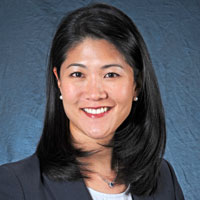Does being part of a pediatric ACO equal better health care for children with disabilities?
August 7, 2019
Children with disabilities are at higher risk for poor physical, psychological and social health than children without disabilities, placing them among the most vulnerable populations. A recent study co-led by researchers at the UNC-Chapel Hill Gillings School of Global Public Health explores whether being part of an accountable care organization (ACO) improves health care for these children.

Dr. Marisa Domino

Dr. Paula Song
An article on the study findings, titled “How does being part of a pediatric accountable care organization impact health services use for children with disabilities?” was published online August 7 by the journal Health Services Research. Lead author Paula Song, PhD, associate professor, and senior author Marisa Domino, PhD, professor, are both faculty in the Department of Health Policy and Management at the Gillings School. Song also is principal investigator for the study, which was funded by the Patient-Centered Outcomes Research Institute.
Emerging from the Affordable Care Act, ACOs are a new model of health care delivery designed to improve the quality and efficiency of patient care. ACOs are, essentially, groups of providers who assume collective responsibility for the overall care of a specific population — such as Medicare beneficiaries — and share in any savings associated with improved quality and efficiency of the care they provide. ACOs reduce health care costs by eliminating duplication of services for patients who have several providers (which is highly common for children with disabilities), and they improve care by ensuring that no care needs are overlooked in the shuffle.
The ACO model is viewed as a potential solution to the United States’ critical need for more coordinated health care, and many state policymakers are promoting ACOs as a way to improve quality while lowering costs in Medicaid programs. Much of the existing research about ACO performance, however, focuses heavily on Medicare and commercial ACOs, with relatively little evidence on ACO performance for high-risk Medicaid populations.
“With this study, we aimed to fill that evidence gap by examining the impact of a Medicaid-serving pediatric ACO on health care services use for children with disabilities,” says Song. “A policy change in Ohio resulted in children with disabilities being switched from fee-for-service plans to managed care plans, and subsequently into a large pediatric ACO, providing natural intervention and control groups.”
Song, Domino, and collaborators from The Ohio State University, Nationwide Children’s Hospital and the University of Arizona identified 17,356 children designated as “aged, blind and disabled” (ABD) through Medicaid as the ACO intervention group (these children lived in the 34 of 88 Ohio counties affected by the policy change), and identified 47,026 ABD‐enrolled children who resided outside of the ACO region as the non‐ACO control group.
“We used a difference‐in‐difference design to examine changes in patterns of health care services use by ABD‐enrolled children before and after enrolling in an ACO, compared with ABD‐enrolled children enrolled in non‐ACO managed care plans,” explains Song. “Ultimately, we found that being part of an ACO seems to improve quality of care in certain areas — such as adolescent well-child visits — but there may be room for improvement in other areas, like home health services, which are considered important by patients and their families.”
To date, 12 states have sponsored Medicaid ACOs and 10 other states are exploring or pursuing Medicaid ACO programs. The results from this study, the authors say, can offer guidance to states considering alternative payment models by helping them understand the likely impact of ACOs on health services utilization for children with disabilities.
Contact the Gillings School of Global Public Health communications team at sphcomm@listserv.unc.edu.
